Creating opportunity through education
How the Jameel Family is supporting the shared vision of the UN in ensuring a quality education and equal opportunities for all
![]()
![]() The challenges of achieving a quality education for all (SDG 4) and improving gender equality (SDG 5) are inextricably intertwined.
The challenges of achieving a quality education for all (SDG 4) and improving gender equality (SDG 5) are inextricably intertwined.
Despite many decades of activism and reform, across whole swathes of society, women and girls are still currently treated less favorably than men across the world.
They have fewer rights, fewer opportunities, lower pay, lower status. Education is one of the main tools for addressing this indefensible discrepancy. Education is the keystone in building a foundation for greater opportunities, greater rewards and a greater contribution to society for everyone. It is a vital staging post on the journey to a fairer, more equitable world in which women and girls – as well as men – are empowered to achieve their full potential.
SDG 4: Quality Education

In fact, the goal of achieving a quality education for all is not only a catalyst for improving gender equality, it is also a gateway to many other UN Sustainable Development Goals (SDGs). In the words of UNESCO, “Every goal in the 2030 Agenda requires education to empower people with the knowledge, skills and values to live in dignity, build their lives and contribute to their societies.”[1]
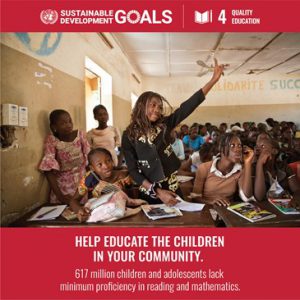 Over the past decade, major progress has been made towards increasing access to education and school enrolment rates at all levels, particularly for girls.
Over the past decade, major progress has been made towards increasing access to education and school enrolment rates at all levels, particularly for girls.
Nevertheless, around 260 million children were out of school in 2018[2] – nearly one fifth of the global population in that age group. In addition, more than half of all children and young people worldwide were not meeting minimum proficiency standards in reading and mathematics[3], and 750 million adults were illiterate, fueling poverty and marginalization.[4]
In 2020, COVID-19 made an already bad situation . . . even worse.
As the pandemic spread across the globe, more than 188 countries imposed countrywide school closures, affecting more than 1.6 billion children and young people, or 91% of students worldwide[5]. Nearly 369 million children who rely on school meals needed to look to other sources for daily nutrition[6].
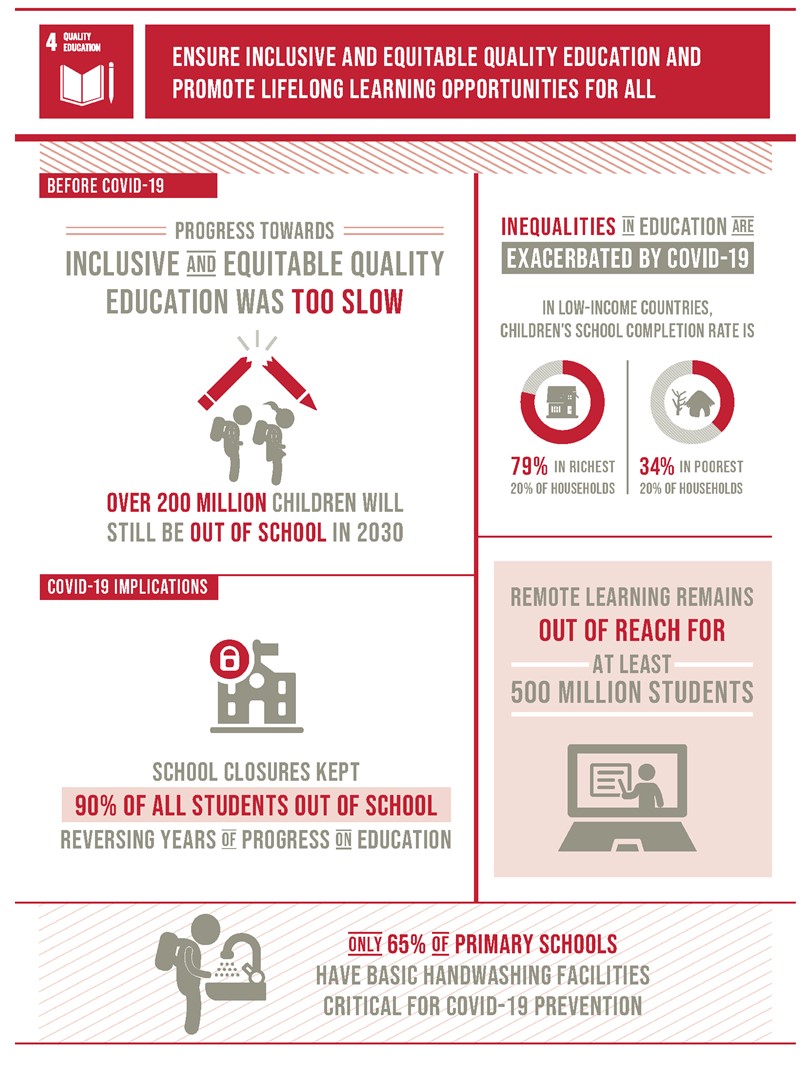
The potential losses in learning and development for today’s young generation are clear to see.
More than two-thirds of countries have introduced a national distance learning platform, but among low-income countries the share is only 30%. Before this crisis, almost one-third of the world’s young people were already digitally excluded[7].
Never before have so many children been out of school at the same time, disrupting learning and upending lives, especially the most vulnerable and marginalized. The consequences are far-reaching and, combined with the pandemic, may jeopardize many of the gains made in recent years in improving global education.
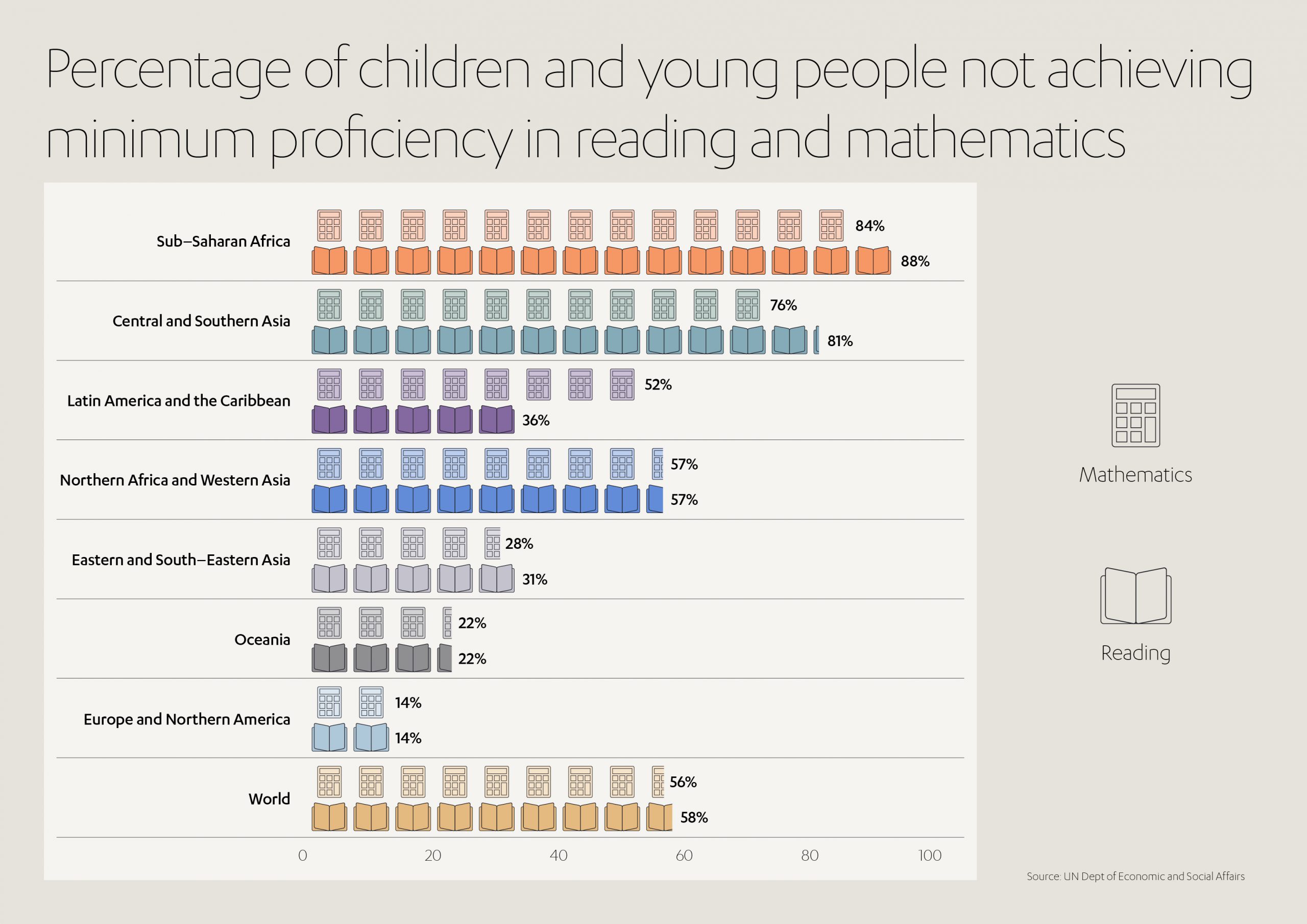
Society-wide benefits
The benefits of achieving SDG 4, and realizing its integral contribution to the other 16 goals, do not only apply to children and young people. Adults also benefit enormously from quality education and learning opportunities.
The UN’s 3rd Global Report on Adult Learning and Education[8] showed that adult learning and education produces significant benefits across a range of policy areas. Countries reported a positive impact on health and well-being, employment and the labor market, and social, civic and community life. Adult learning and education led to improved health behaviors and attitudes, higher life expectancy and a reduction in lifestyle diseases, with a similar reduction in health care costs.
The report also highlighted the significant benefits of investment in adult education for individuals in the labor market, for employers and for the economy more generally. In addition, it showed how adult learning and education increases social cohesion, integration, and inclusion, boosts social capital and improves participation in social, civic and community activities.
Improving accessibility and enhancing opportunity
The Jameel Family shares the passion of the UN and its vision for education as a cornerstone on the journey towards economic independence and gender equality. It recognizes the power of education to drive equal opportunities for all and to release human potential – because one month’s training can bring a lifetime of work. And there is no better way to improve a community than through work. When people have work, they have the ability to contribute to society, they have personal pride, family stability, money to spend and a sense of freedom and self-worth.
That’s why we are committed to improving access to quality education for those most in need, through innovations in pedagogy and technology, scholarships, mentorship, and education programs around the world. With a commitment to breaking down the barriers that hold back learning, we support teachers and students, entrepreneurs and musicians, providing platforms for individual growth and systems-wide transformation.

The Abdul Latif Jameel World Education Lab (J-WEL) at the Massachusetts Institute of Technology (MIT), an initiative of MIT and Community Jameel, one the global philanthropies of the Jameel Family, works with member organizations to promote excellence and transformation in education worldwide. The lab engages educators, technologists, policymakers, civic leaders, employers, and employees through online and in-person collaborations, workshops, research, and information-sharing events.
J-WEL member organizations work with MIT faculty and staff to address global opportunities for scalable change in education, focusing on three key areas or ‘collaboratives’:
- J-WEL pK-12 is reinventing pre-school, elementary, middle, and high school education to develop communities of the future thinkers and doers of the planet by engaging growing numbers of diverse learners and educators through design, research and implementation of educational innovations.
- J-WEL Higher Education is building a community of global leaders that will transform higher education for success of students across the globe.
- J-WEL Workforce Learning is working with schools, companies, governments, nonprofits to transform the nature of workforce learning around the world.
J-WEL is also one of the founders of the Transforming Refugee Education towards Excellence (TREE) program, set up in response to the refugee crises in Syria and beyond. A collaboration with Save the Children, the initiative comprises a systems-wide teacher training program that uses compassion to help teachers overcome trauma and deliver effective teaching. TREE was launched in 2019 with a pilot in Jordan, in collaboration with the Ministry of Education, Community Jameel, Dubai Cares and Hikma Pharmaceuticals. It aims to reach 745,000 Jordanians and Syrian refugees in five years, including school children, parents and teachers.
Another collaboration between Community Jameel and MIT is the Abdul Latif Jameel Poverty Action Lab (J-PAL), which has a specific education strand to its work. J-PAL’s Education sector seeks to improve access to, and the delivery, of high-quality schooling at the primary and post-primary levels through research on issues like pedagogy, teacher training, incentives (for children, for teachers, for families), school governance, early childhood development, and information and communications technology.
Initiatives include research into the use of a computer-based adaptive learning platform for secondary school students in urban India to measure the impact of customized learning technology on student test scores; and an evaluation of the effect of secondary school scholarships in Ghana on educational attainment, cognitive skills and life outcomes.
A particular focus of Community Jameel is on making high quality education more accessible to students who many not ordinarily have the ways or means to benefit. One of the ways it does this is through scholarships to deserving students across the globe:
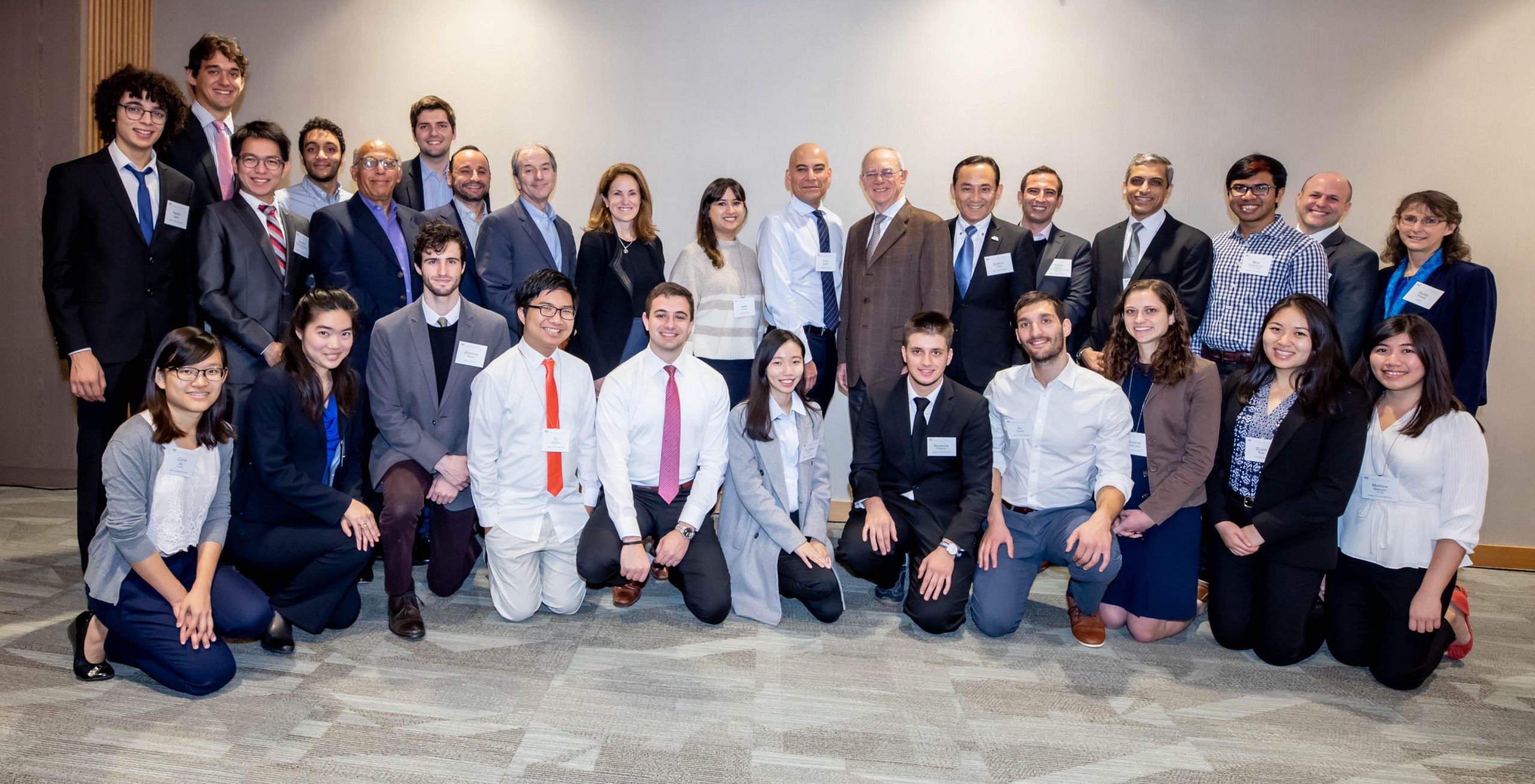
 The Abdul Latif Jameel-Toyota Endowed Scholarship was established in 1994 to help young people achieve their potential at MIT, one of the world’s leading academic institutions. Jameel-Toyota scholars come from over 25 countries from across Asia, the Middle East and North Africa and receive financial aid for undergraduate study at MIT. The scheme has helped over 190 scholars from 27 countries since 1994.
The Abdul Latif Jameel-Toyota Endowed Scholarship was established in 1994 to help young people achieve their potential at MIT, one of the world’s leading academic institutions. Jameel-Toyota scholars come from over 25 countries from across Asia, the Middle East and North Africa and receive financial aid for undergraduate study at MIT. The scheme has helped over 190 scholars from 27 countries since 1994.
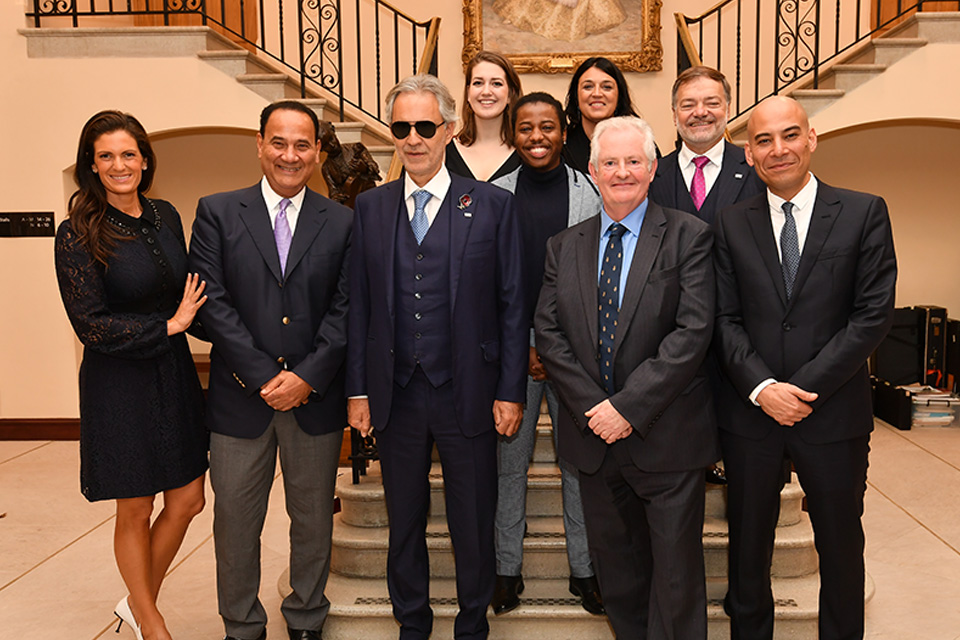
![]() Similarly, the Andrea Bocelli Foundation-Community Jameel Scholarship was launched in 2019 to support students who study full-time at the Royal College of Music, London, one of the world’s leading conservatoires for the performing arts.
Similarly, the Andrea Bocelli Foundation-Community Jameel Scholarship was launched in 2019 to support students who study full-time at the Royal College of Music, London, one of the world’s leading conservatoires for the performing arts.
The scholarship helps talented students to overcome barriers and access world-class training.
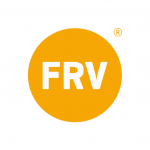 Fotowatio Renewable Ventures (FRV), part of Abdul Latif Jameel Energy, also runs a scholarship program in partnership with the Instituto de Empresa (IE), a leading international university in Spain.
Fotowatio Renewable Ventures (FRV), part of Abdul Latif Jameel Energy, also runs a scholarship program in partnership with the Instituto de Empresa (IE), a leading international university in Spain.
The Young Talented Leaders Scholarship enables students from locations close to FRV developments to study at IE University. The scholarship covers all training and education costs, including tuition fees, accommodation, academic materials, and allowances for travel and meals in Spain during the four-year degree program.
In our home market of Saudi Arabia, we established the Tanweer Program for Orphans in 2005 to make a meaningful difference for orphans and brighten their lives. It is organized by Community Jameel Saudi Arabia in partnership with the Saudi Arabian Ministry of Labor and Social Development. Tanweer rewards orphan students aged 14-18 who have achieved outstanding academic results with an annual international trip, expanding their cultural horizons and motivating them to continue studying hard at school.
In the creative arts sector, meanwhile, Art Jameel takes a combined approach to education, learning and research, with an arts education program that begins at primary age and continues through to post-graduate level. Initiatives include Jameel House Online, a program of online workshops inspired by the traditional arts. Intended for artists and enthusiasts of all levels, including children, the workshops combine traditional arts with contemporary materials. Another online program is Jaddaf Aloud Online, which is a spin-off from the annual festival at Jameel Arts Centre, Dubai. It is a virtual program that features UAE-based artists designing and leading interactive projects for kids, teens and adults.
SDG 5: Improving gender equality

SDG 4 has a strong gender perspective, linking very strongly to aims and ambitions of SDG 5: Gender equality. The close relationship between education and gender is grounded in evidence showing the close links between girls’ education and social and economic development, including poverty reduction: one additional school year can increase a woman’s earnings by 10% to 20%; each year of secondary education reduces the likelihood of marrying as a child by five percentage points or more; and a child whose mother can read is 50% more likely to live past the age of five[9].
The UN states that “gender equality is not only a fundamental human right, but a necessary foundation for a peaceful, prosperous and sustainable world.”[10]
Yet to date, only two thirds of the world’s countries have achieved gender parity in primary school enrolment, and just over one third have achieved parity in lower secondary enrolment[11].
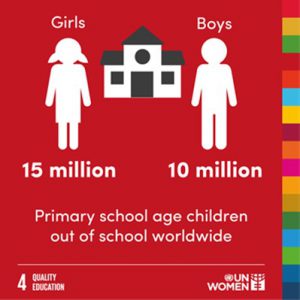 There has been progress over the last decades: More girls are going to school, fewer girls are forced into early marriage, more women are serving in parliament and positions of leadership, and laws are being reformed to advance gender equality[12].
There has been progress over the last decades: More girls are going to school, fewer girls are forced into early marriage, more women are serving in parliament and positions of leadership, and laws are being reformed to advance gender equality[12].
Despite these gains, however, many challenges remain; challenges that have, in many cases, been worsened by the effects of the COVID-19 pandemic.
The coronavirus outbreak exacerbates existing inequalities for women and girls across every sphere – from health and the economy, to security and social protection.
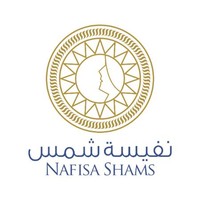 The Jameel Family are strong advocates for increased education and opportunities for women. In 2006, it established Nafisa Shams in its home market of Saudi Arabia to provide women with an integrated work environment to help them produce high quality artisanal products. This is achieved through specialized training programs and production lines, including, for example the working from home program, which empowers Saudi women to achieve a balance between family responsibilities and an active role in the job market.
The Jameel Family are strong advocates for increased education and opportunities for women. In 2006, it established Nafisa Shams in its home market of Saudi Arabia to provide women with an integrated work environment to help them produce high quality artisanal products. This is achieved through specialized training programs and production lines, including, for example the working from home program, which empowers Saudi women to achieve a balance between family responsibilities and an active role in the job market.
Nafisa Shams has also launched Nafisa Shams Incubator, one of the first female business incubators, with a focus on design and crafts.
J-PAL also has a specific focus on gender. Its gender sector produces cross-cutting insights on promoting gender equality and women and girls’ empowerment, and on how norms related to gender affect the outcomes of social programs. One project involved evaluating the teaching girls in Zambia to negotiate health and educational decisions with authority figures in their lives. Researchers found that girls who were taught negotiation skills had better educational outcomes in the following three years.
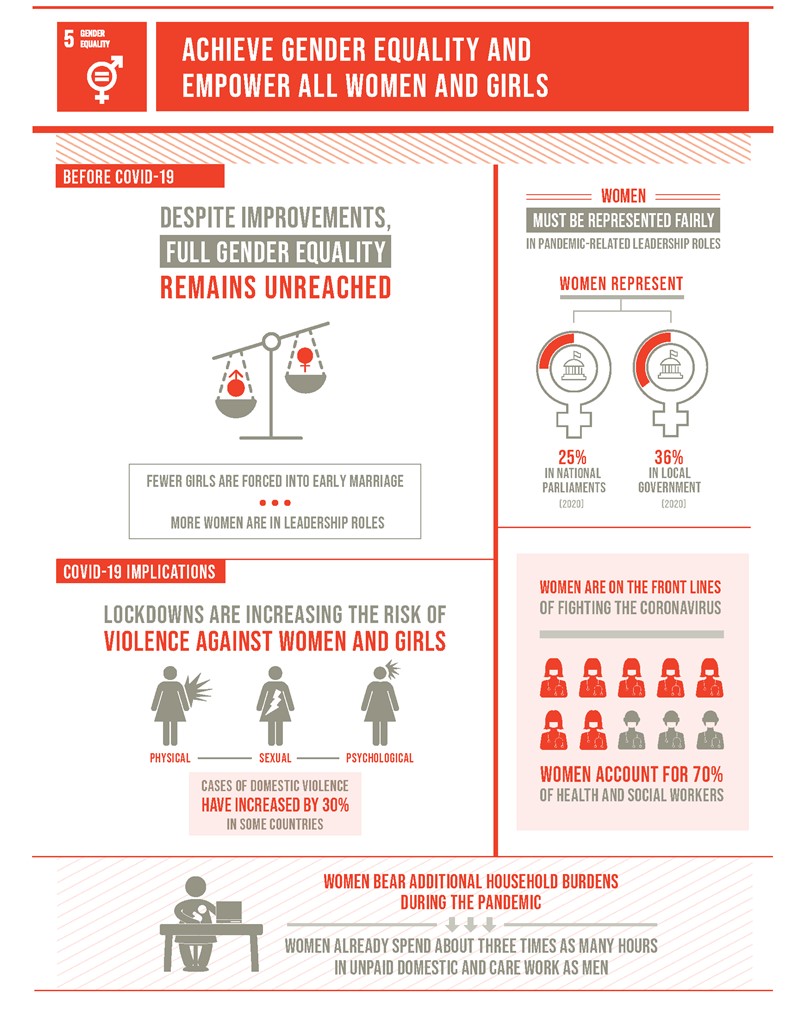 The success of Nafisa Shams builds on the achievements of Bab Rizq Jameel (BRJ) or ‘beautiful gateway to prosperity’ in Arabic, which was set up three years earlier in 2003. BRJ helps young women and men in Saudi Arabia, Egypt and Morocco to find work. It matches people to jobs and helps create opportunities for employment as a step towards economic independence. Today, BRJ includes BRJ Recruitment, BRJ Microfinance and BRJ Services, and it offers vocational training programs and youth-oriented employment training programs for men and women.
The success of Nafisa Shams builds on the achievements of Bab Rizq Jameel (BRJ) or ‘beautiful gateway to prosperity’ in Arabic, which was set up three years earlier in 2003. BRJ helps young women and men in Saudi Arabia, Egypt and Morocco to find work. It matches people to jobs and helps create opportunities for employment as a step towards economic independence. Today, BRJ includes BRJ Recruitment, BRJ Microfinance and BRJ Services, and it offers vocational training programs and youth-oriented employment training programs for men and women.
The Saudi chapter of the MIT Enterprise Forum, for which Community Jameel is a key partner, also works to empower women and provide opportunities to excel and grow their skills.
At a regional level, MITEF Pan Arab’s main goal is promoting and enriching the entrepreneurship ecosystem in the Arab World, while supporting startups and entrepreneurs in the region through a diverse portfolio of programs and initiatives.
The Saudi MITEF chapter was founded with the goal of promoting, encouraging and celebrating the entrepreneurship ecosystem specifically in Saudi Arabia through an annual competition. Traditionally, the business sector in the country has been dominated by men, but thanks to programs like these, there has been a huge increase in the number of female entrepreneurs. This is evidenced by the female participation rate in MITEF Saudi Arabia’s annual competition: By the end of the 5th cycle (Q1 2021), the program has over 8,500 applications, more than 44% of which are from women.
Investing in a better, fairer tomorrow
Although governments hold the main responsibility for ensuring quality education and equal opportunities for women, the UN’s Sustainable Development Goals are a universal and collective commitment. It requires political will, global collaboration and the engagement not only of governments and multinational agencies, but of private capital, of communities and of individuals, in order to tackle the challenges and build systems that are inclusive, equitable and accessible.
Through our continued investment in the ‘infrastructure of life’ around the world, from education and equality, to food systems and energy, the Jameel Family is committed to working in partnership with others to build a fairer, greener, more prosperous future for all, as we strive for solutions to some of the most challenging questions facing humanity.
Learn more about how the Jameel Family’s activities are contributing to the Sustainable Development Goals by visiting: https://jameel75.com/sdg to watch our video and download a summary report.
[1] https://en.unesco.org/themes/education2030-sdg4
[2] http://uis.unesco.org/en/topic/out-school-children-and-youth
[3] https://unstats.un.org/sdgs/report/2019/goal-04/
[4] https://en.unesco.org/themes/education2030-sdg4
[5] https://unstats.un.org/sdgs/report/2019/goal-04/
[6] https://www.un.org/sites/un2.un.org/files/policy_brief_on_covid_impact_on_children_16_april_2020.pdf
[7] https://www.un.org/sites/un2.un.org/files/policy_brief_on_covid_impact_on_children_16_april_2020.pdf
[8] https://unesdoc.unesco.org/ark:/48223/pf0000372274
[9] https://www.globalpartnership.org/benefits-of-education
[10] https://www.un.org/sustainabledevelopment/gender-equality/
[11] https://www.undp.org/content/undp/en/home/sustainable-development-goals/goal-5-gender-equality/targets
[12] https://www.unwomen.org/-/media/headquarters/attachments/sections/library/publications/2020/gender-equality-womens-rights-in-review-key-facts-and-figures-en.pdf?la=en&vs=935





 1x
1x

 Added to press kit
Added to press kit


